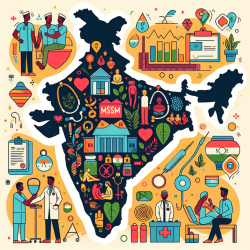Introduction
In the realm of healthcare, understanding the unique needs of diverse populations is crucial for delivering effective and compassionate care. The research article "Men who have sex with men in India: A diverse population in need of medical attention" highlights the health challenges faced by men who have sex with men (MSM) in India. As practitioners, it is essential to recognize these challenges and integrate the findings into clinical practice to improve health outcomes for this population.
Understanding MSM in India
MSM in India represent a diverse group with varying identities, orientations, and behaviors. It is important for practitioners to differentiate between sexual identity and sexual behavior. A man may engage in sexual activities with other men without identifying as homosexual or bisexual. Understanding these nuances is critical for providing non-judgmental and effective care.
Health Challenges and Risks
The article highlights several health challenges faced by MSM in India, including a higher prevalence of HIV and sexually transmitted infections (STIs) compared to the general population. Factors contributing to these risks include social stigma, lack of access to healthcare, and insufficient education about safe sexual practices.
- HIV prevalence among MSM in India is significantly higher than the national average.
- STIs such as herpes simplex virus-2, syphilis, gonorrhea, and chlamydia are prevalent among MSM.
- Mental health issues, including depression and anxiety, are more common due to social stigma and discrimination.
Strategies for Improved Care
Practitioners can adopt several strategies to improve healthcare delivery for MSM:
- Non-judgmental Communication: Use gender-neutral language and avoid assumptions about sexual identity based on behavior.
- Routine Screening: Encourage regular HIV and STI screenings, even in the absence of symptoms, as many STIs can be asymptomatic.
- Education and Counseling: Provide education on safe sexual practices and the importance of using protection to reduce STI transmission.
- Mental Health Support: Screen for mental health issues and provide referrals to mental health professionals when needed.
Encouraging Further Research
The article emphasizes the need for more research on the health needs of MSM in India. Practitioners are encouraged to contribute to this body of knowledge by conducting studies, sharing findings, and advocating for policies that support MSM health.
Conclusion
By understanding the unique health needs of MSM in India, practitioners can provide more effective and compassionate care. This not only improves individual health outcomes but also contributes to the broader goal of public health improvement.
To read the original research paper, please follow this link: Men who have sex with men in India: A diverse population in need of medical attention.










